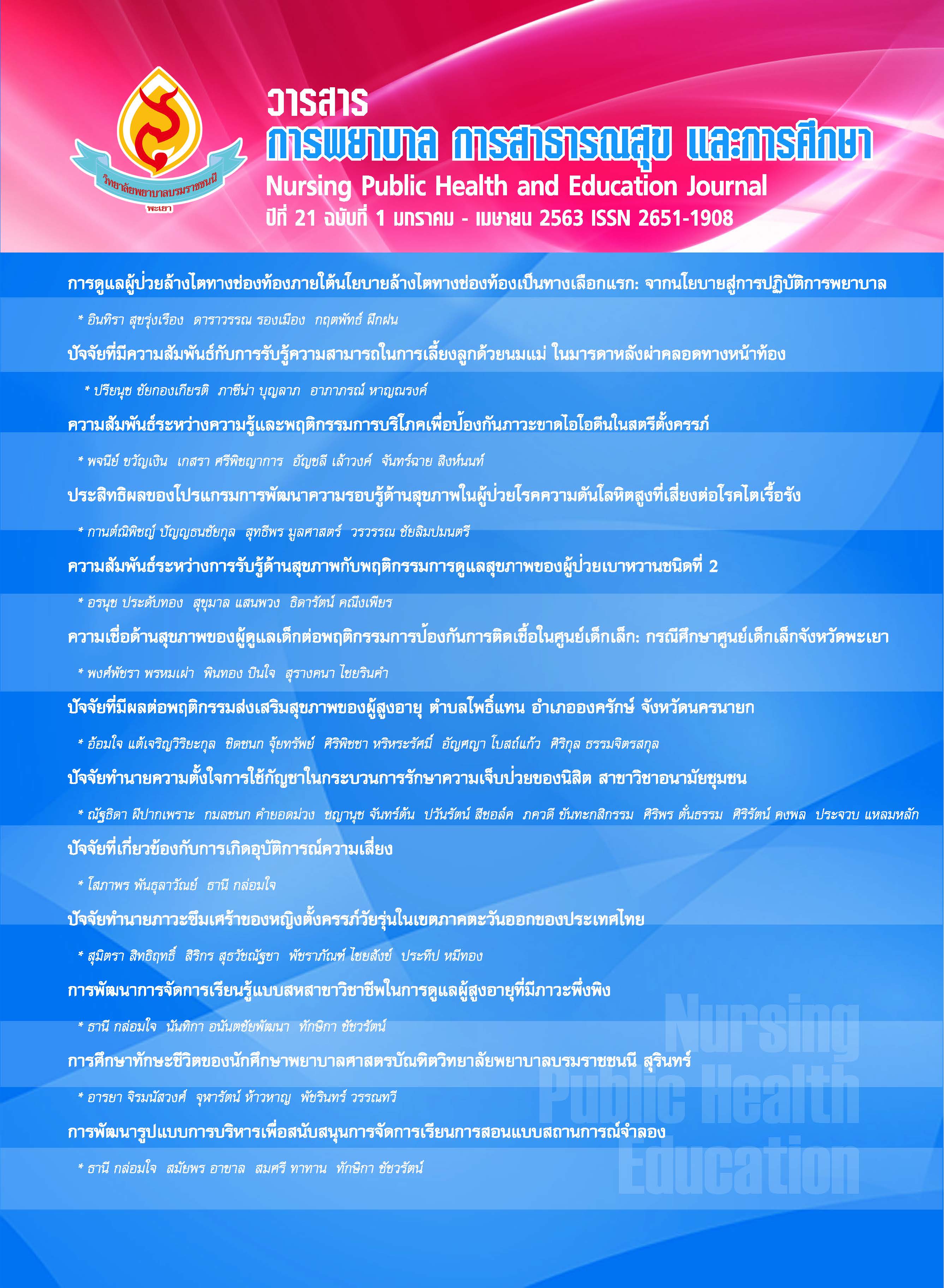ประสิทธิผลของโปรแกรมการพัฒนาความรอบรู้ด้านสุขภาพ ในผู้ป่วยโรคความดันโลหิตสูงที่เสี่ยงต่อโรคไตเรื้อรัง
คำสำคัญ:
ความรอบรู้ด้านสุขภาพ, พฤติกรรมการจัดการตนเอง, โรคความดันโลหิตสูง, โรคไตเรื้อรังบทคัดย่อ
การวิจัยกึ่งทดลองแบบสองกลุ่มวัดผลก่อนและหลังการทดลอง มีวัตถุประสงค์เพื่อศึกษาประสิทธิผลของโปรแกรมการพัฒนาความรอบรู้ด้านสุขภาพต่อความรอบรู้ด้านสุขภาพ พฤติกรรมการจัดการตนเอง ระดับความดันโลหิต ระดับโซเดียมและอัลบูมินในปัสสาวะของผู้ป่วยโรคความดันโลหิตสูงที่เสี่ยงต่อโรคไตเรื้อรัง กลุ่มตัวอย่างเป็นผู้ป่วยโรคความดันโลหิตสูงที่ควบคุมความดันโลหิตไม่ได้ โดยมีระดับความดันโลหิตซิสโตลิก 140-179 มิลลิเมตรปรอท หรือระดับความดันโลหิตไดแอสโตลิก 90-109 มิลลิเมตรปรอท และมีอัตราการกรองของไตอยู่ในระดับที่ 1 และ 2 อยู่ในอำเภอเมือง จังหวัดชัยนาท ซึ่งถูกคัดเลือกโดยวิธีการสุ่มแบบชั้นภูมิ เป็นกลุ่มทดลองและกลุ่มเปรียบเทียบ กลุ่มละ 30 คน เครื่องมือดำเนินการวิจัยประกอบด้วย 1) โปรแกรมพัฒนาความรอบรู้ด้านสุขภาพที่พัฒนาขึ้นตามแบบจำลองเส้นทางพัฒนาความรอบรู้ด้านสุขภาพ มีระยะเวลา 12 สัปดาห์ กิจกรรมประกอบด้วยการอบรมเชิงปฏิบัติการและการเยี่ยมบ้าน เพื่อสร้างความรู้ทางสุขภาพ พัฒนาทักษะความรอบรู้ด้านสุขภาพและการปฏิบัติ ส่งเสริมการปฏิบัติเกี่ยวกับความรอบรู้ด้านสุขภาพ พัฒนาทักษะการสร้างทางเลือก และทักษะการใช้ข้อมูลเพื่อตัดสินใจทางสุขภาพ 2) คู่มือความรอบรู้ด้านสุขภาพสำหรับผู้ป่วยโรคความดันโลหิตสูงที่เสี่ยงต่อโรคไตเรื้อรัง และ3) แบบสอบถามความรอบรู้ด้านสุขภาพและ พฤติกรรมการจัดการตนเอง มีค่าดัชนีความตรงเชิงเนื้อหา เท่ากับ .90 และ 1.00 ตามลำดับ แบบสอบถามความรอบรู้ด้านสุขภาพมีค่าความเที่ยงของคูเดอร์-ริชาดสัน 20 เท่ากับ .81 และแบบสอบถามพฤติกรรมการจัดการตนเอง มีค่าสัมประสิทธิ์แอลฟาของครอนบราค เท่ากับ .78 วิเคราะห์ข้อมูลโดยใช้สถิติเชิงพรรณนาและสถิติที ผลการวิจัยพบว่า หลังการเข้าร่วมโปรแกรม ผู้ป่วยโรคความดันโลหิตสูงที่เสี่ยงต่อโรคไตเรื้อรังในกลุ่มทดลองมีคะแนนเฉลี่ยความรอบรู้ด้านสุขภาพและพฤติกรรมการจัดการตนเองมากกว่าก่อนเข้าร่วมโปรแกรมและมากกว่ากลุ่มเปรียบเทียบ อย่างมีนัยสำคัญทางสถิติที่ระดับ .05 ส่วนระดับความดันโลหิต ระดับโซเดียมและ อัลบูมินในปัสสาวะมีค่าน้อยกว่าก่อนเข้าร่วมโปรแกรมและน้อยกว่ากลุ่มเปรียบเทียบอย่างมีนัยสำคัญทางสถิติที่ระดับ .05
เอกสารอ้างอิง
กรมควบคุมโรค. (2559). คู่มือปฏิบัติการเพื่อดำเนินงานลดโรคไตเรื้อรัง (CKD) ในผู้ป่วยเบาหวานและความดันโลหิตสูง. กรุงเทพ: สำนักงานกิจการโรงพิมพ์ องค์กรสงเคราะห์ทหารผ่านศึก ในพระบรมราชูปถัมภ์.
กรมควบคุมโรค. (2561). จำนวนและอัตราผู้ป่วยใน ปี 2559 - 2561 (ความดันโลหิตสูง, เบาหวาน, หลอดเลือดหัวใจ, หลอดเลือดสมอง, COPD). สืบค้นเมื่อ 2 ธันวาคม 2561, จาก http://www.thaincd.com/2016/ mission/documents-detail.php?id=13684&tid=32&gid=1-020
กองสุขศึกษา. (2553). ผลการสำรวจ ความฉลาดทางสุขภาพในกลุ่มเยาวชนอายุ 12-15 ปี. กองสุขศึกษา กรมสนับสนุน บริการสุขภาพ กระทรวงสาธารณสุข.
กองสุขศึกษา กรมสนับสนุนบริการสุขภาพ กระทรวงสาธารณสุข. (2556). ความฉลาดทางสุขภาพเส้นทางสู่หมู่บ้านปรับเปลี่ยนพฤติกรรมลดโรคมะเร็ง ความดันโลหิตสูง หัวใจและหลอดเลือด. สืบค้นเมื่อ 10 ธันวาคม 2561, จาก www.hed.go.th
กองสุขศึกษา กระทรวงสาธารณสุข. (2559). การสำรวจความรู้แจ้งแตกฉานด้านสุขภาพผู้ป่วยโรคเบาหวานและความดันโลหิตสูง. สืบค้นเมื่อ 10 ธันวาคม 2561, จาก www.hed.go.th
นพพร ธนะชัยขันธ์. (2555). สถิติเบื้องต้นสำหรับการวิจัย. กรุงเทพฯ : วิทยพัฒน์
ประภัสสร งาแสงใส, ปดิรดา ศรสียน และสุวรรณา ภัทรเบญจพล. (2557). กรณีศึกษาความฉลาดทางสุขภาพของอาสาสมัครประจำหมู่บ้าน.วารสารเภสัชศาสตร์อีสาน, 9(ฉบับพิเศษ), 82-87.
ประเสริฐ ธนกิจจารุ. (2558). การรักษาความดันโลหิตสูงในผู้ป่วยโรคไตเรื้อรัง. วารสารกรมการแพทย์, 2(5), 36-48.
พีระ บูรณะกิจเจริญ และคณะ. (2558). แนวทางการรักษาโรคความดันโลหิตสูง ในเวชปฏิบัติทั่วไป พ.ศ. 2555 ฉบับปรับปรุง พ.ศ. 2558. กรุงเทพ: สมาคมความดันโลหิตสูงแห่งประเทศไทย.
ทวี ศิริวงศ์ ชลธิป พงศ์สกุล ศิริรัตน์ เรืองจุ้ย และประณิธิ หงสประภาส. (2553). แนวทางเวชปฏิบัติของโรคไตเรื้อรัง. วารสารอายุรศาสตร์อีสาน, 9(3), 144-162.
ธิดารัตน์ อภิญญา . (2559). คู่มือปฏิบัติการเพื่อดำเนินงานลดโรคไตเรื้อรัง (CKD) ในผู้ป่วยเบาหวานและความดันโลหิตสูง. กรุงเทพฯ : สำนักงานกิจการโรงพิมพ์องค์กรสงเคราะห์ทหารผ่านศึกในพระบรมราชูปถัมภ์.
สมาคมโรคไตแห่งประเทศไทย. (2558). คำแนะนำสำหรับการดูแลผู้ป่วยโรคไตเรื้อรังก่อนการบำบัดทดแทนไต พ.ศ. 2558.กรุงเทพฯ: สมาคมโรคไตแห่งประเทศไทย.
แสงเดือน กิ่งแก้ว และนุสรา ประเสริฐศรี. (2558). ความสัมพันธ์ระหว่างความฉลาดทางสุขภาพและพฤติกรรมสุขภาพของผู้สูงอายุที่เป็นโรคเรื้อรังหลายโรค. วารสารพยาบาลกระทรวงสาธารณสุข, 3(25), 43-54
สุนิสา สีผม. (2556). การจัดการตนเองในผู้ป่วยโรคไตเรื้อรัง. วารสารพยาบาลสภากาชาดไทย, 6(1), 12-18.
สุรศักดิ์ กันตชูเวสศิริ. (2560). เครือข่ายลดบริโภคเค็มเตือนช่วงเทศกาลกินเจให้ระวังอย่าปรุงเค็มจัด. สืบค้นเมื่อ 2ธันวาคม 2561, จาก https://www.hfocus.org/content/2017/10/14778
อรุณี หล้าเขียว และทวีวรรณ ชาลีเครือ. (2559). ความฉลาดทางด้านสุขภาพและปัจจัยที่มีความสัมพันธ์ต่อการรับประทานยาในผู้ป่วยโรคความดันโลหิตสูง โรงพยาบาลส่งเสริมสุขภาพตำบลบ้านเปียงหลวง จังหวัดเชียงใหม่.วารสารบทคัดย่อ กลุ่มวิทยาศาสตร์และเทคโนโลยี. สืบค้นเมื่อ 20 กุมภาพันธ์ 2561, จาก www.grad.mahidol.ac.th/th/current-students/thesisabstract.php?id=1
Bloom, B. M. (1968). Learning for Mastery. Center for the Study of Evaluation of Instructional Programs. Evaluation comment, 1(2), 1-12.
Edwards, M., Wood, F., Davies, M., & Edwards, A. (2012) .The development of health literacy in patients with a long – term health condition: the health literacy pathway model. BMC Public Health, 14, 120-130.
Kickbusch, I. S. (2001) . Health Literacy: addressing the health and education divide. Yale University School of Public Health. New Haven, CT, USA.
Kidney Foundation – Kidney Disease Outcome Quality Initiative [NKF-K/DOQI]. (2002) . K/DOQI Clinical practice guidelines for chronic kidney disease: Evaluation, classification and stratification. New York: National Kidney Foundation.
Krishnan, S. M. (2014) . Inflammatory markers or mediators of hypertension?. British Journal of pharmacology, 171 (24) , 5589-602.
Neupane, D., McLachlan, C. S., Sharma, R., Gyawali, B., Khanal. V., Mishra, S. R., Christensen, B., & Kallestrup, P. (2014) . Prevalence of hypertension in member countries of South Asian Association for Regional Cooperation (SAARC) : systematic review and meta-analysis. Medicine (Baltimore) ,93 (13), 1-10.
Patel, N., Ferris, M., & Rak, E. (2016) . Health and nutrition literacy and adherence to treatment in children, adolescents, and young adults with chronic kidney disease and hypertension, North Carolina, 2015. Prev Chronic Dis. 13(4), E101.
World Health Organization. (2019). World Hypertension Day 2019. Retrieved March 10, 2019 from https://www.who.int/docs/default-source/documents/hypertension-infographic- 005-web.pdf?sfvrsn=f0973d0c_2
ดาวน์โหลด
เผยแพร่แล้ว
รูปแบบการอ้างอิง
ฉบับ
ประเภทบทความ
สัญญาอนุญาต
ลิขสิทธิ์ (c) 2020 วารสารการพยายาล การสาธารณสุข และการศึกษา

อนุญาตภายใต้เงื่อนไข Creative Commons Attribution-NonCommercial-NoDerivatives 4.0 International License.



